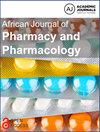Microbial and physical evaluation of selected cough syrups sold at peripheral drug outlets in Bushenyi District, South Western Uganda
引用次数: 0
Abstract
Syrups, being non-sterile liquid pharmaceutical formulations, are prone to microbial contamination. The most common microbial contaminants are bacteria and fungi. Contamination of oral liquid pharmaceuticals makes them hazardous due to potential to cause infections, and may also change their physical, chemical, and organoleptic properties. This study assessed the microbial quality and physical characteristic parameters of 10 samples from each of four different brands of cough syrup sold in Ishaka, Bushenyi district. Microbial quality was assessed on samples of the syrups using spread-plate method via surface spreading of prepared dilutions of the different samples on agar plates. Plates were then incubated and colonies counted and expressed as number of colony forming units per milliliter (CFU/ml). The brand mean pH ranged from 3.04 to 5.02 and density from 1.05 to 1.35 g/cm 3 respectively. All sampled brands were compliant for pH, density, color and taste specifications. Out of the 40 tested samples, 57.5% showed total viable counts within the acceptable British Pharmacopoeia (BP) limit (≤100 CFU/ml), while 42.5% showed results outside the specified limit. All samples complied with BP requirements for Staphylococcus aureus while 97.5% samples complied with BP requirements for Escherichia coli . Based on mean CFU/ml, all the four brands met the acceptance limits for both S. aureus and E. coli , but one of the brands had an unacceptably high total viable count. Adequate quality control measures and stringent regulatory monitoring should be enforced in the supply chain to reduce on chances of product contamination.对乌干达西南部布申伊地区周边药品销售点销售的部分咳嗽糖浆进行微生物和物理评价
糖浆是非无菌的液体药物制剂,容易受到微生物污染。最常见的微生物污染物是细菌和真菌。口服液体药物的污染使其具有危险性,因为有可能引起感染,还可能改变其物理、化学和感官特性。这项研究评估了在布神邑区Ishaka销售的四种不同品牌咳嗽糖浆中的10个样本的微生物质量和物理特征参数。使用琼脂平板法,通过在琼脂平板上对不同样品的制备稀释液进行表面铺展,对糖浆样品的微生物质量进行评估。然后培养平板,计数菌落并将其表示为每毫升菌落形成单位数(CFU/ml)。品牌平均pH值为3.04至5.02,密度为1.05至1.35g/cm3。所有抽样品牌均符合pH值、密度、颜色和口味规格。在40个测试样本中,57.5%的样本显示总活菌计数在可接受的英国药典(BP)限值内(≤100 CFU/ml),而42.5%的样本的结果超出了规定限值。所有样本均符合金黄色葡萄球菌的BP要求,97.5%的样本符合大肠杆菌的BP要求。根据平均CFU/ml,所有四个品牌都达到了金黄色葡萄球菌和大肠杆菌的可接受限度,但其中一个品牌的总活菌数高得令人无法接受。应在供应链中实施充分的质量控制措施和严格的监管监督,以减少产品污染的机会。
本文章由计算机程序翻译,如有差异,请以英文原文为准。
求助全文
约1分钟内获得全文
求助全文

 求助内容:
求助内容: 应助结果提醒方式:
应助结果提醒方式:


